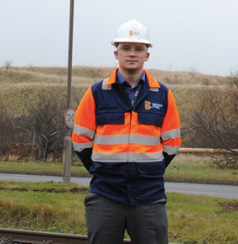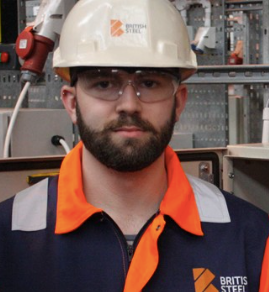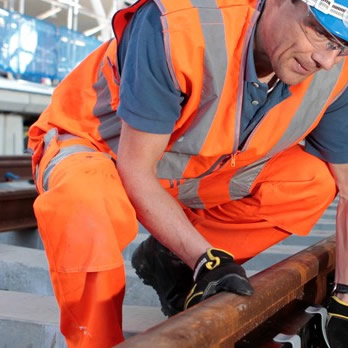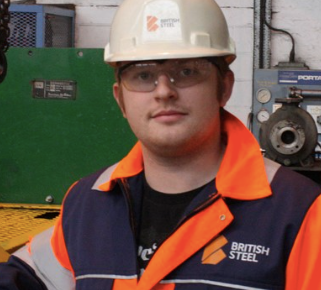Searching: British Steel
Case Studies

Ellie Patrick, Business Admin Apprentice, British Steel
A day in the life of Ellie Patrick. One of British Steel's Apprentices' Ellie Patrick shares her Procurement experiences.
Be Inspired
Ellie Patrick, Business Admin Apprentice, British Steel
What made you choose an apprenticeship with us?
After finishing my GCSEs at Vale Academy in Brigg, I decided the apprenticeship route was the best career path for me. I was excited when I saw the Functional Apprenticeship vacancy; it was too good an opportunity to miss. The vast amount of experience and knowledge I could gain through completion of the apprenticeship programme made the opportunity particularly attractive. I was keen to begin learning in the workplace through experiencing different roles within the Procurement department, as well as through the completion of an NVQ in Business Admin.
What are the top three highlights of your job?
There is a great variety of processes and products for me to develop my knowledge. Every day is different, making the role both challenging and enjoyable.
The opportunity to visit different site areas on a regular basis is extremely interesting. I love seeing how the work I do in the office directly impacts areas out on plant.
I have enjoyed building relationships with colleagues in Procurement. The support I have received from my first day in the business has made me feel comfortable and a valued member of the team.
What work have you been doing within the Procurement department?
The most recent experience I have had within Procurement has been in the Sundry Sales role. The Sundry Sales team receive requests from plant areas to sell items, ranging from coal to machinery, which they no longer require. Recently, I have been working with the Structural Workshops to sell redundant equipment and bring money back into the business. To date, this has generated significant savings – the work is still ongoing.
I have also been researching new companies to sell our products to and building relationships with external stakeholders both in the UK and overseas. I have enjoyed visiting different plant areas and broadening my knowledge of the business, plant areas and products we sell.
What advice would you give to any young people considering a career here?
I would encourage anyone considering a career here to grasp the opportunity! Working within such a large business that allows you to tailor your own career with the support of fellow colleagues is a rare and rewarding experience.
When you were younger, what did you want to be when you grew up?
A policewoman – I then realised the press-ups in the police entrance fitness test would get the better of me!

Ellie Patrick, Business Admin Apprentice, British Steel

Jordan Bainbridge, British Steel, Supply Chain Placement Student
Jordan Bainbridge is on our 12-month Placement Programme in Supply Chain. Jordan has been with us for 4 months and has kindly given us an insight into his journey so far at British Steel.
Be Inspired
Jordan Bainbridge, British Steel, Supply Chain Placement Student
Age: 20
Position: Supply Chain Placement Student
Location: Scunthorpe
University: University of Lincoln
Course: Business and Marketing
What is your role within British Steel and what does it involve?
“I’m currently forming part of the Supply Chain Outbound Logistics department. Within the team I regularly assist in the invoice tracking for deliveries. I’m also working on improving the current system we use for tracking, to make the process more automated and therefore reducing time spent on the task. This is important as it’s keeping with the companies continuous improvement strategy that it is integrating into its culture.
“My main project I’ve been given responsibility for is the renewal of all rail crossing signage out on site. This is a complex task due to the size of the Scunthorpe site. There are nearly 100 signs that need to be renewed and with each one come a lot of assessments, precautions and procedures that need to be put in place prior to work. The key I’m finding to this task is ensuring continuous communication with suppliers, engineers, plant managers as well as the other colleagues needed to execute this task.”
Why did you choose to work for British Steel?
“Being fairly local to the area, I already had prior knowledge of British Steel before joining and therefore had some indication to the impressive scale of the operation. Upon further research I found more information that only impressed me further, including the employment rate of around 4,000 people, a site more than 2,000 acres in size with over 100 miles of internal rail and 40 miles of road.
“I also was keen on the idea of working in large-scale manufacturing and with 150 years of heritage and an operation that produces 3 million tonnes of quality steel products every year, I couldn’t say no to the opportunity.”
How would you describe British Steel’s culture and how you fit into it?
“The culture at British Steel is very traditional but takes on new aspects of modern thinking. Many employees that work here have decades of experience under their belts, which fuels passion and pride within the workplace. You can learn something new from everyone you meet here, and there’s plenty of people to meet.
“I feel I fit into this culture purely by willing to learn from everyone here and also by bringing my own ideas to the business.”
How do you think your experience at British Steel will help with your future career goals?
“I feel the name British Steel carries a lot of respect with people across the country appreciating the scale of work that it does – it’s definitely an impressive and stand-out name to have on your CV.
“More importantly there are lots of opportunities here to grow your skill set in many different environments and even secure permanent positions with British Steel as it’s always looking to grow its workforce.”
What do you think is the best thing about working for British Steel?
“The thing I like most about working here is the diversity of the work. Working in a large-scale organisation can throw up interesting challenges in a range of fields. Even on my own project, which in theory should be repetitive, there are always new issues that need to be resolved. One of the best things about this is it takes you out of your comfort zone. There are always people willing to help but knowing you got through an issue using your own initiative, meeting people and gaining insight you wouldn’t have done otherwise, is very rewarding.”
What do you find most challenging about working for British Steel?
“The most challenging bit is finding the right contacts. On a site as big as this, there are many people with different roles and responsibilities so finding the right person who can help you can sometimes be time-consuming.
“Also, when first starting in the job, driving on site can be rather daunting, especially when you’re only given a location of an office building that sometimes is only as big as a house. But once you’ve been on site a few times, it does get a lot easier.”
Can you describe British Steel in 3 words?
“I would say huge, proud and iconic. I’ve already mentioned the size of the site and the pride of those working within it, but I think it’s the heritage that is a defining feature of the company. Since the recent rebranding, the heritage has been used as a building block to develop a strong brand and culture for the modern workplace.”
Do you have any advice for people currently applying to British Steel?
“There is a definite British Steel culture and going from my experiences, recruiters choose people that will fit into this and integrate into one of the teams.
“Speaking from my experience as a placement student, I don’t think your past experience or education is any more important than your attitude to work. You’re here to gain the experiences of British Steel so it’s more important that your personal values align with that of the company.”

Jordan Bainbridge, British Steel, Supply Chain Placement Student

Joshua Haywood, Finance Graduate, British Steel
Joshua Haywood is on our Graduate Programme in Finance. Josh has been with us for 4 months and has kindly given us an insight into his journey so far at British Steel.
Be Inspired
Joshua Haywood, Finance Graduate, British Steel
Age: 21
Position: Finance Graduate
Location: Scunthorpe
University: University of Lincoln
Course: Business and Finance
Joshua Haywood is on our Graduate Programme in Finance. Josh has been with us for 4 months and has kindly given us an insight into his journey so far at British Steel.
What is your role and how long have you been in it?
“I’m currently part of the finance department at British Steel, concentrating on the Construction business. I’ve currently been in this role for about 4 months and I’m based in Scunthorpe, however I do get opportunities to travel to different places such as Wolverhampton and Teesside.
“Since starting my job I’ve been given a variety of work and responsibilities. Within my role I undertake daily tasks such as revenue monitoring to ensure it all matches up with sales tonnage, and creating reports to identify which customers debts are overdue. I also undertake pricing and costing analysis to make sure the prices charged on our products are in line with costs and that costs are also reported accurately so we can produce accurate analysis and reports for the business leaders.
“Alongside these day-to-day tasks there are also jobs that need to be done on a monthly basis, such as month-end reporting. This includes gathering all the data from various places to accurately report the business’ result for the month. This includes balance sheet and profit statement reconciliations, ensuring everything balances with the underlying data.
“The project work I get involved in is generally around benefit analysis and investment appraisal. So in simple terms I investigate whether a project will add value financially or whether it may not be worth doing.”
Why did you chose to work for British Steel?
“From having a background in finance and economics, I had a prior knowledge of the steel industry as it was often used as a case study at university. The market had always intrigued me and when I saw the position available I immediately got excited about possibly working in the industry for British Steel.
“I was also excited to be able to work for a company that has shown resilience to overcome many challenges in its short time as British Steel. These environments are great to learn from and take with you as your career develops.
“Another aspect was that the salary offered was significantly better than those of similar roles being advertised at the same time.
“Once I had applied for the role the assessment centre also helped persuade me to take the job. The Early Careers Team made the process so straightforward, answering any questions before the day very quickly as well as making me feel at ease on the day of the assessment centre. I immediately felt welcome.”
How they would describe the culture of British Steel and how you fit into it?
“I would describe the culture at British Steel as many things, but most of all refreshing. There is so much care about the employees, and everything is done with the employees in mind.
“There’s also health and safety at the heart of everything the business does. From when you first start in your induction, it’s drilled into you the importance of looking after yourself and others. If a job can’t be done safely it won’t be done at all.
“A continuous improvement culture is currently being embedded into the business. Every day is about improvement, growth and learning, and all ideas are taken into consideration. From a personal view, as long as I can keep improving day by day, with the help of the business, then anything is possible and we can achieve great things.
“I would also say it’s welcoming and friendly. From day one everyone makes time to talk to you, whether it’s about work or just wanting to know more about yourself. The majority of people you come into contact with seem to have a positive attitude and mindset which is often contagious.”
How do you think your role at British Steel will help with your future career goals?
“British Steel outlined in its job offer that it’s willing to invest in its employees and allow them to gain internationally recognised professional qualifications to further their knowledge and skillset. This is important in the world of finance and so far they have lived up to this statement.
“The opportunity of gaining a professional accountancy qualification, with help and funding from British Steel, will open new doors for me personally. It will also help me to move through the company and further my career, while giving back to the company at the same time.
“The internal set-up within British steel is also fantastic. Every graduate and placement student is given their own personal mentor and champion that they can chat to confidentially about any topic, at any time, whether it be work-related or personal. These mentors and champions already have the experience within the business to guide you through the early stages in your career, and allow you to grow both professionally and personally.”
What do you think the best thing about working for British Steel is?
“The best part about working for British Steel is the people. Everyone is always friendly, and always willing to help.
“My first 3 months were spent as part of the construction team. During this time I worked very closely to people from all kinds of backgrounds and disciplines, and having got to know most of them very well, there is always someone who is happy to lend a helping hand.”
What do you find most challenging about British Steel?
“So far, the most challenging part was having very little experience in the industry. At first, it was always tough to get into the conversations and know what to say right away. However, people don’t just expect you to know everything, so if ever there’s a problem, all you need to do is say so. When you need anything clarifying, if you ask someone they will be more than happy to help.”
Can you describe British Steel in 3 words
“If I could describe British Steel in 3 words, the first would be versatile. There are a lot of different scenarios in every job and it’s central to your role that you’re able to adapt your skills and mindset for every situation.
“The second word I would choose is interesting. Every day brings with it new processes, people and situations. I would like to think everyone at British Steel would describe their role as exciting because there’s just so much opportunity.
“The last word I would use to describe British Steel is developing. Both the business and its employees are growing in confidence and abilities. This role will definitely equip me for the future.”
Have you got any advice for people currently applying to work for British Steel?
“My advice for anyone wanting to apply for British Steel would be to read up about the company, and read the online hints, including the CV tips. Take your time and plan your answers for the video interview, and when on the assessment centre, just stay calm and relaxed, because its designed to get the best out of you, not trip you up, so try and enjoy the experience.”

Joshua Haywood, Finance Graduate, British Steel

Lucy Jones, Energy Specialist Graduate, British Steel
We sat down with one of our graduates, Lucy Jones, who completed her placement three years ago, and now enjoys a substantive post at British Steel...
Be Inspired
Lucy Jones, Energy Specialist Graduate, British Steel
Age: 25
Position at British Steel: Energy Specialist (third year at British Steel)
Course: MEng Electronic and Electrical Engineering
University: Loughborough University
What attracted you to British Steel?
I live locally and I’ve got family that work here, and I did a placement between my third and fourth year at university which I enjoyed. I knew that they’d be able to offer me quite a wide variety of positions by speaking to family who work here.
What duties does your role include?
I’m on the implementation team for energy optimisation, so currently I’m facilitating implementation projects that could possibly save money within the company. Examples of these are upgrading kit and installing VSD’s (variable speed drives) which control the speed of motors, allowing them to slow down and save power instead of running at full speed unnecessarily. My favourite position so far was working at the Scunthorpe Rail Section Mill. When I was there I looked after day-to-day management of maintenance, such as ordering spare parts, organising the work for the next week, looking after the team, preparing for stock periods, and really just the general running of the plant electrically.
How did your degree prepare you for your new position?
The project I did at university in my final year was how to design a patch antenna for clothes, so it didn’t really prepare me for the high end electrical side as here it’s mainly medium and high voltage, whereas that was more electronics and communication. However, the process that you go through to write a thesis, skills such as time and project management definitely came in handy and obviously it’s helpful knowing the theoretical basics before you go on to apply your knowledge practically.
What are your colleagues like?
Really friendly and supportive which is great, because when you’ve just started as a graduate you’ve just done all the theory side of everything and it can be a bit overwhelming, but they were all so eager to help me settle in. Like, for example, if they were going out to perform a task, they’d always come to me and say ‘Lucy, we’re just going out to do this, have you done it yet?” Basically they’d invite me to come along and learn things with them as they did it, which I thought was really good.
What advice do you have for anyone thinking of joining?
Get your application in in a timely manner, be enthusiastic, have a solid CV and just be open to everything!

Lucy Jones, Energy Specialist Graduate, British Steel

Nico Breviglieri, Degree Apprentice, British Steel
Nico Breviglieri is currently studying one of our unique degree-level apprenticeships, merging higher education with practical, hands-on experience.
Be Inspired
Nico Breviglieri, Degree Apprentice, British Steel
What made you choose an apprenticeship with us?
At the time, I was working as an operator here on Appleby Frodingham Coke Ovens when I decided that I wanted a career change, I was working on my BTEC level 3 in engineering on my days off when this opportunity came up. I originally had an interview for the electrical apprenticeship but then received a phone call a couple of weeks later to come back and interview for the degree apprenticeship, which I was later offered a position. It’s a brilliant opportunity, as well as earning money I’m also receiving training that would usually cost thousands. In five years’ time, I will be a fully qualified electrical engineer.
What work have you been doing within the electrical degree apprenticeship?
Initially we began with the domestic side of electrics, learning about consumer units, MC’s and cable diversity. At the minute, I’m working on wiring within a panel simulating the sort of things we will be doing on site. I’ve just completed a traffic light circuit which was great figuring out how it all worked and the real-world applications it had. My next task will involve stripping a motor, testing it in order to see if it is safe for use and then re-building it.
With regards to the “degree” side of the apprenticeship, it’s mostly theoretical work and calculations, although we have started working on small circuits in electrical principals, creating attenuators and measuring their values with an oscilloscope
What’s the structure of your degree apprenticeship like?
It’s five years altogether. I spend 4 days a week at the training centre and 1 day in college, which will all change come September.
The HNC takes 2 years to complete, after which I’ll spend a year doing my HND, and then finally onto my Bachelor’s degree in years four and five. Alongside this I will also be working on plant taking part in six monthly rotations, learning my trade.
What are your prospects of progressing after your apprenticeship?
Once I’ve finished my apprenticeship I hope to be taken on by British Steel. From here I will look to firstly becoming an incorporated engineer, then a chartered engineer which will hopefully show British Steel my commitment to the point where they might consider funding my master’s degree.
What advice would you give to any young people considering a career here?
I’d tell them what a great opportunity this was and that this kind of experience and training won’t be found anywhere else around here. It is a far better option that university and there are plenty of chances to progress within the company. The tutors have a great understanding of their individual trades and are very helpful.

Nico Breviglieri, Degree Apprentice, British Steel

Nish Goel, Technical Engineer Graduate, British Steel
Nish Goel is a recent graduate currently doing his first of four six-month rotations across various technical disciplines.
Be Inspired
Nish Goel, Technical Engineer Graduate, British Steel
Age: 23
Position at British Steel: Technical Engineer - Environmental Department
Course: MEng Chemical Engineering with Energy
University: The University of Sheffield
What attracted you to British Steel?
There were two main reasons, one of them was the opportunity to be part of one of the leading experts in long steel products across the UK and France. British Steel furthermore offers excellent graduate opportunities such as the four rotations of six months each across various technical disciplines, which will allow me to enhance my knowledge and skills. Secondly, the company provides guidance towards becoming a Chartered Chemical Engineer, which is one of my aims.
What duties does your new role include?
I am currently working on a pilot plant for the biological treatment of coke oven effluents and am also part of the commissioning team for the treatment of blast furnace effluents. Since these projects are pilot plant-based, it depends on how these pilot processes perform as the results will determine if these processes can be scaled up. Our main aim is to reduce the ammonia nitrogen concentration and the suspended solids at the output of the process in order to comply with the limits set by the Environmental Agency.
How did your degree prepare you for your new position?
From my university course I learnt the basics of chemical engineering and learnt about several processes and their operation in greater depth. Furthermore from the design project and research project as part of the course I enhanced my team working, problem solving, analytical and researching capabilities, which have all been very beneficial.
What are your new colleagues like?
My colleagues have been really good as they are always very supportive and easily approachable to resolve any questions or queries. They are happy to take us around the site, teach us more about their job roles and the projects they are working on, which is a great opportunity to learn more.
What advice do you have for anyone thinking of joining?
I would advise taking part in various projects, jobs and any extra-curricular activities to increase your communication, team working and problem solving skills as they will be beneficial for any job you have as part of the company. Also if you have any queries always ask.

Nish Goel, Technical Engineer Graduate, British Steel

On the right tracks
The German Rhine Line needed an effective noise suppression system. British Steel’s SilentTrack® was identified as the ideal solution.
Be Inspired
On the right tracks
Adaptable for track configurations anywhere in the world, SilentTrack® is a flexible solution for tackling isolated ‘noise hot spots’.
The challenge
Growing public concern about noise nuisance, particularly in urban areas, has resulted in the introduction of noise-related legislation. These new regulations are compelling the international railway industry to act. In Germany, high levels of both road and rail traffic are funnelled through the Rhine Valley, creating unacceptably high noise exposure levels.
Due to rising public concern, The German Federal Environment Agency asked railway operators to reduce railway noise for people living close to noise ‘hot spots’.
Rail noise had been a major issue along the Rhine Valley, where high traffic density – especially freight trains – created unacceptably high noise levels.
The traditional solution of noise barriers was ineffective due to topography, as many properties were located on hillsides overlooking railways, leaving the option of reducing rail traffic density or train speeds as the only alternative.
The solution
SilentTrack® by British Steel is a proven system for reducing train pass-by noise by 3-6dB(A). Designed to be used in areas where track noise is the main noise source, SilentTrack® provides better noise reduction and quicker installation compared to competitors’ damper products. It is also less visually obtrusive and has lower costs than noise barriers.
SilentTrack® is a highly effective rail noise damper system, designed by British Steel’s Research and Development team in partnership with globally renowned acoustic experts at the University of Southampton.
A complete system of SilentTrack® tuned dampers were fitted along the Rhine Line – with impressive results. A reduction in the ‘pass-by’ noise of each train of between 3.0 and 4.0dB(A) resolved the problems being experienced by local residents.
The system is now installed on 45km of Rhine Line track. This means:
- Better quality of life for people living near the railway line
- The Rhine Line is meeting the requirements of noise legislation
Impressive track record speaks volumes
The effectiveness of SilentTrack® has been repeatedly demonstrated. Its distinctive characteristics include:
- Holland – now installed on 85km of track after the Netherlands became the first country to approve the product in 2004
- UK – Network Rail approval was granted in 2009, with the first installation in 2012 as part of the Thameslink project
- Australia – New commuter line comprising 16km fitted with British Steel rail dampers was opened in 2009
In addition, installations have been completed in:
- France
- Sweden
- Czech Republic
- Italy
- Norway
- China
- Switzerland
- Singapore
The product
SilentTrack® was developed by British Steel’s Research and Development team, working with British Steel’s Rail division. SilentTrack can be optimised for any type of rail profile (including UIC54, 60E1 and 56E1), any fastening type (such as Vossloh, Pandrol and Nabla) or sleeper (for example, concrete mono-block or bi-block, concrete slab, steel, timber).
"The SilentTrack® system is quick and easy to fit and enables us to maximise the amount of work done during track closure, making the work cost effective for the railway company. We are able to fit the SilentTrack system to 300m of track per hour."
Roland van Uuden, Hering Gleisbau

On the right tracks

Robin Marsh, Mechanical Apprentice, British Steel
Robin Marsh is one of our mechanical apprentices currently in the first year of his three year course.
Be Inspired
Robin Marsh, Mechanical Apprentice, British Steel
What made you choose an apprenticeship with us?
I’ve had four generations of my family working on the steelworks, and I’ve always had a passion towards working with metal and machinery, so it seemed like a logical progression for me to move into the steelworks as I can follow what I enjoy doing and carry on the family tradition.
What work have you been doing within your mechanical apprenticeship?
At the minute I’m working on mechanical assemblies and maintenance, and I’m working on a diesel motor at the moment as well. I really enjoy getting hands on and finding out how things work.
What is the structure of your apprenticeship like?
My apprenticeship is three years, with my first year spent entirely in the workshop. Second and third years we’re on plant putting what we’ve learnt into practice, with one day per week in second year on day release back in the workshop for extra training.
What are your prospects of progressing after you’ve finished?
If you’ve done well, made a good impression and showed your quality there’s employment opportunities right off the bat here, which is brilliant.
What advice would you give to any young people considering a career here?
Just get your head down, work hard and progress and you’ll be definitely rewarded for that. The tutors here will give you hints and tips to guide you in the right way but it’s all about showing your own initiative.

Robin Marsh, Mechanical Apprentice, British Steel

Usman Sami Khan, Mechanical Engineering graduate, British Steel
We asked Mechanical Engineering graduate Usman Sami Khan how he was finding life at British Steel...
Be Inspired
Usman Sami Khan, Mechanical Engineering graduate, British Steel
Age: 22
Position at British Steel: Graduate Mechanical Engineer
Course: B.Eng Mechanical Engineering
University: University of Sheffield
What appealed to you about British Steel?
Whilst skimming through various graduate schemes, British Steel’s graduate scheme really stood out to me because it provided a structured two year training scheme with rotations across different engineering departments, providing an in-depth comprehensive training into the world of steel-making. In addition, being an international student studying here in the UK, British Steel’s graduate scheme also stood out to me because of the fact that they sponsor international students for a Tier 2 work visa.
What duties does your new role include?
As part of the two-year graduate scheme, there are four six-month rotations across different engineering departments.
I am currently on a six-month placement in Caster 4, which is one of the continuous casters producing steel blooms. As part of this, I am currently involved in the maintenance of the caster, where I shadow colleagues on different maintenance tasks which may be either planned, or caused by a sudden breakdown. I have also been given a maintenance project to work towards during my six months over here.
How did your degree prepare you for your new position?
I believe the degree you study at university really helps you bring some solid skills on the table. Learning in a classroom is one thing, but actually seeing the theory being applied in practical industrial applications makes you understand things in a whole new perspective. My dissertation provided me with a chance to work towards a structured objective, conducting experiments and working towards tight deadlines to ensure a timely completion. Presenting my work towards a panel of assessors instilled a sense of confidence towards my work, which will help me present the work I carried out as part of my placement to senior engineers here at British Steel.
None of the work given to you here is just thrown at you – there is prior training and courses to attend to help aid your understanding before you can crack on with the work.
What are your new colleagues like?
The working environment over here is absolutely great for young engineers like myself. My colleagues are always ready to help and always willing to assist with any questions that I may have. I have been stuck plenty of times trying to learn new things about the casting process and machinery and have always gone to someone for help with absolutely no hesitation at all. All my colleagues are very welcoming and I have settled in well with the team here at Caster 4 in absolutely no time!
Do you have any advice for graduates applying for British Steel?
Apply early on to beat the competition and really focus on your application, providing evidence of skills you can bring to the company which can set you apart from the rest of the candidates. These skills may be coming from either your academic qualities or from your extra-curricular activities, whatever they may be. Remember to structure your answer well and really hone it to the core competencies required for the role, whilst also aligning your answer to the core values of the company.
